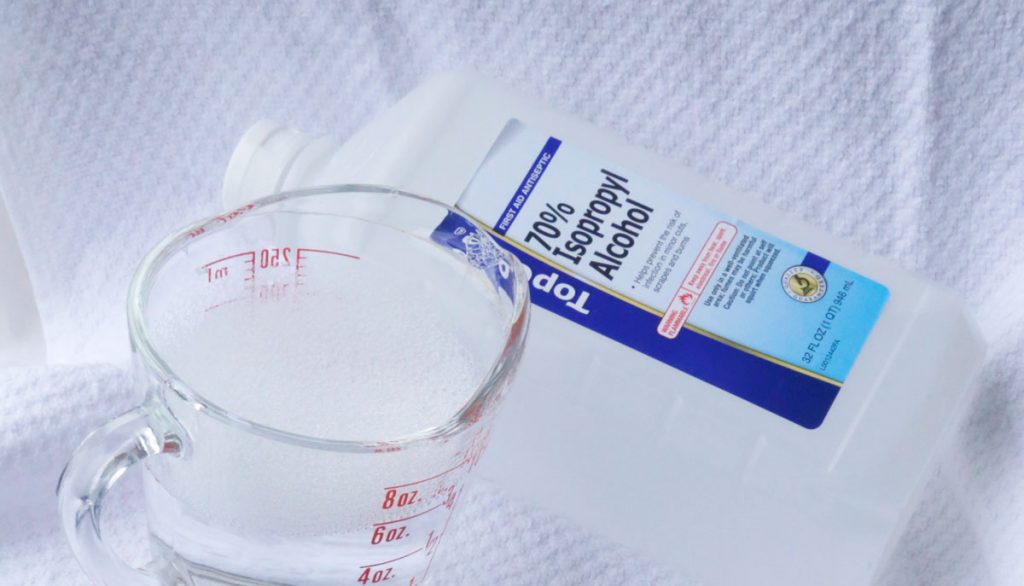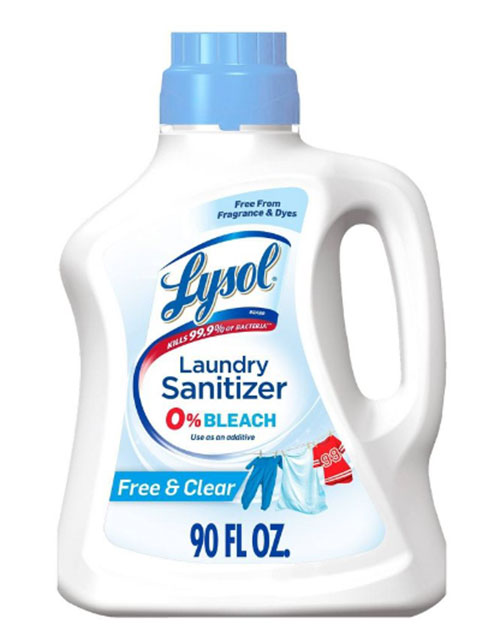Isopropyl Alcohol, also called Rubbing Alcohol, can be used to clean many things at home. Does rubbing alcohol get rid of smells? Yes, it does, and here are several ways to use it safely.
Great uses for 70% strength Isopropyl Alcohol as it dries quickly
- As a cleaning and deodorizing solution with antibacterial properties, keep a spray bottle in a cupboard away from children: Mix 70% Isopropyl Alcohol with a 1 to 2 water ratio. The water in the solution opens up bacteria to absorb the alcohol, which then kills the bacteria. It can also kill viruses and fungi and discourage creepy crawlies. As a cleaner, this solution produces less vapor, dries quickly, and can eliminate oils and leave nearly no traces.
- Place some in a small spray bottle and use it as a disinfectant for makeup brushes, rings, thermometers, scissors, and manicure tools. It is also good for disinfecting makeup bags and often-used surfaces around the house, such as door handles and your cell phone, laptop keyboard, screen, and mouse.
- Personal Care Uses: Since it can kill bacteria, viruses, and fungi, isopropyl alcohol is beneficial for skin care. When nurses take blood, they swab your skin with a cotton ball dipped in isopropyl alcohol. A small amount can clean bug bites and where your ears are pierced to avoid infection. Although breathing it in large amounts may not be good you don’t need to be afraid of smelling it in small amounts.
- Use it on the skin to prevent infection from minor surface wounds like scraped knees, cuts, or before and after pulling out a small splinter, etc. Dab a little full strength onto a cotton ball and apply it to the wound. Or use a little from a small spray bottle. Be careful not to breathe it in too much. Although there are no reports of humans dying of vapors, you should still be careful and always use Rubbing Alcohol in a well-ventilated area.
- Use a small amount as an additive to help laundry detergent disinfect more. Please wait for the item to dry before applying it. You can also help freshen mattresses, pillows, and bedding by spraying them with a 70/30 water solution. Use Isopropyl Alcohol in a well-ventilated space and leave the room while the items are in the process of drying.
This tip works exceptionally well when you add a few drops of your favorite essential oil, such as lavender or rosemary, to the spray bottle. - Eliminate odors in smelly sneakers, old purses, upholstery, stored clothing, and cupboards.
- Use as a small-parts cleaner and grease solvent. Isopropyl Alcohol is used commercially in many things, such as car windshield washers and de-icers. Many salons use Isopropyl Alcohol to clean their clients’ fingernails. It is excellent for use with Nail Polish. Salons also use it in a unique Shellac Nail finish.
Please Note that Shellac finishes cannot be done at home as they require specialized curing equipment. Since traditional nail polish is more toxic than we realize, new alternatives are available. - Isopropyl alcohol is also used as a water-drying agent to prevent otitis externa or “swimmer’s ear,” as it is commonly referred to. To do this, use a mixture of 1 part white vinegar and 1 part rubbing alcohol before and after swimming. Using an eyedropper just outside the ear, apply 5 milliliters or about one teaspoon of the solution into each ear, tip your head, and let it drain back out. Wipe excess off with a dry towel. This helps promote drying and prevents the growth of bacteria and fungi that can cause “swimmer’s ear.” Please Note: Do this only if you are sure you do not have a punctured eardrum.
- Use this mixture to eliminate musty mildew odors caused by dampness at Home or at the Cottage. Half the vinegar and isopropyl alcohol should be poured into a spray bottle. The solution should be sprayed on affected fabrics, furniture, and clothing. The vinegar helps kill the mildew bacteria, and the isopropyl alcohol helps make it quick to dry. Spray in a well-ventilated room or outdoors, or leave the room for a couple of hours after spraying to avoid breathing in.
- Special note: Moving into a cottage after being empty for a few weeks can have a mildewy odor. I found that the best and fastest way to clear it was to use an electric kettle filled with vinegar and a little water. Plug it in and let it boil in the various rooms. It would be best to do this repeatedly to fill the room with steam. The vinegar’s steam will kill the mildew. It only takes a few days to do this two or three times a day to rid the place of the odor. You can also use vinegar in your cleaning solutions to help. Often, mildew settles into fabrics left in a damp area. Launder with a cup of vinegar, and this helps.

You can use Isopropyl Alcohol as a Carrier for Fragrant Oils.
Isopropyl Alcohol kills germs and is good for cleaning many things in the house. Sometimes, after vacuuming your mattresses during spring cleaning, you also want to freshen them up. You can add some natural oils, such as Rosemary, Eucalyptus, Lavender, and Peppermint, to a spray bottle that has Isopropyl Alcohol in it as a carrier. This helps freshen up pillows and more. Use sparingly, as a little goes a long way.
Spray Bottle Recipe for Fabric Treatment: Place 1 cup of Isopropyl Alcohol into a medium-sized spray bottle that can be shut off when not in use so that the alcohol does not evaporate between uses. Add about ten or twelve drops of your favorite scent of essential oil. Shake. You can mix the oils to create a most fragrant combination. Spray the solution lightly on the fabric’s surface you would like to disinfect. It is best to leave the room once you have sprayed until the area is dry to not breathe in the Isopropyl Alcohol too much. Don’t overspray until things are wet; this is just a re-fresh. There is no substitute for laundering or dry cleaning of items.
Get Rid of Smells and Odors at Home.
Rubbing Alcohol Odor Removal is great. You can also eliminate smells and odors at home with the following solutions.
- Try a spray bottle with a mix of half vinegar, half water and a few drops of dish soap. Spray this into the air and it works to disinfect some molds and mildews. It is also a good cleaner as you can spray it on countertops, bathroom sinks and other areas then wipe with clean dry cloths.
Hydrogen Peroxide can be used for cleaning, air freshening, and plant care.
- Hydrogen Peroxide is a natural anti-bacterial air freshener. Use it in small amounts as it is helpful to eliminate germs that can enter your nostrils through the air. Fill a small spray bottle with Hydrogen Peroxide and use it as an atomizer in short bursts into the air.
Fresh sprigs of Rosemary placed in the Hydrogen Peroxide spray bottle create a lovely, refreshing aroma. (You can enhance this with a few drops of Rosemary essential oil) - A small atomizer-style spray bottle filled with Hydrogen Peroxide can also be used to spray plants that you have brought inside the house to overwinter after a summer outdoors. This will help get rid of fungus, mites, or fruit flies that may have landed on your plants. To be safe, repeat the process for a few days. This can also be used if you find an infected houseplant.
One time, while staying at a friend’s home while she was away on holiday, she asked me to look after her many plants, a cat, and a dog. I noticed that one of her favorite plants had developed an infestation. So, I took a cotton ball moistened with hydrogen peroxide and wiped down the leaves. I also gave the whole plant a spritz every other day. When my friend returned two weeks later, the plant was fine and sprouting new leaves.
About Rosemary
- Rosemary Herb contains carnosic and rosmarinic acids, and it has many valuable properties such as being:
Antibacterial, antiviral, antifungal, and anti-inflammatory. It fights infection and can help the immune system. - Rosemary is rich in antioxidants. Rosemary is often said to help improve memory and cognitive performance.
- The aroma of rosemary sometimes relieves stress and anxiety.
- Hormonal benefits: Rosemary may help detoxify estrogens in the liver, which may be helpful for women with heavy periods, PMS, fibroids, and other conditions.
- Rosemary oil is known for its beneficial attributes for the hair and scalp. It can also protect the skin from sun damage. It may promote hair growth, prevent baldness, slow graying, and treat dandruff and dry scalp.
- Blending Hydrogen Peroxide with a small amount of Rosemary is a great natural air freshener for bathrooms, pet odors, kitchen refreshers, garbage pails, and more.
A Laundry Freshener

The author receives no compensation for recommending the above product.
Talking About Laundry, here is a bonus clue to keep your dishcloths, tea towels, and other items smelling fresh and clean.
For years, I did everything to try to prevent dishcloths, in particular, from smelling. I washed them sometimes daily. I tried many things until one day when I used Free and Clear Lysol Laundry Sanitizer along with my regular unscented laundry soap. That did it.
There is no longer a foul dishcloth smell, no longer a bacteria-causing odor on the dishcloths, and no more artificial perfumes!
Now I feel confident wiping down kitchen counters and know they are immaculate.
Rubbing Alcohol Spray For Pest Control of Mice
Clean the area thoroughly where you may have seen droppings. Once it is dry, you can spray a solution of six drops of Eucalyptus Essential Oil and six drops of Peppermint Essential Oil mixed with Isopropyl Alcohol along this area.
Mice do not like the smell. Mice use the same avenues to travel to their dens repeatedly, laying down their scent so they can find their way. This solution destroys their odor, so they can’t return the same way. This solution acts as a disinfectant and deodorizer. Unfortunately, it does not remove mice permanently; you must use other methods to rid your home of mice. One is too many. If you see one, go into action, as there could be more!
Do you have any holes in your attic or foundation? Behind walls in the bathroom or basement? These can be areas where they hide.
Properties and Safety Concerns for Rubbing Alcohol.
Isopropyl Alcohol is a volatile, flammable liquid with a clear and colorless appearance. It has a pungent odor and produces vapors due to its fast-drying properties.
- Be sure to use these safety tips.
- Do not use Isopropyl Alcohol on deep wounds.
- Do not ingest or apply it to organs or openings in the body’s lower extremities.
- Not to be taken internally. Do not drink, eat, or ingest in any way.
- Use in a well-ventilated area.
- Since Isopropyl Alcohol is sold in containers, you must pour it to mix or use it. Therefore, to eliminate the risk of ingesting it, do not handle it in the kitchen or near food sources. The best place for handling is in the laundry room or bathroom.
- Please don’t use it near an open flame since it is flammable.
- If by any chance a child or adult accidentally swallows rubbing alcohol, call 911 immediately.



